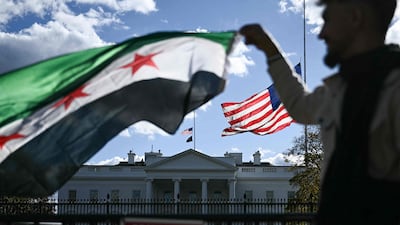Two decades ago, Syrian President Ahmad Al Shara was imprisoned in an American-run detention centre in Iraq and later had a $10 million US bounty on his head. On Monday, he shook hands with US President Donald Trump in the Oval Office, the symbolic heart of American political power. Beyond the visit’s significance for Mr Al Shara personally, it was an historic moment for the Syrian people – the first time ever that a Syrian head of state has visited the White House.
In addition to the symbolism, there was plenty of substance. As well as cementing personal relationships with Mr Trump and his Cabinet, the White House confirmed that Mr Al Shara signed an agreement to join the International Coalition to Defeat ISIS. The Trump administration also intends to freeze Ceasar Act economic sanctions on Syria for 180 days.
Both moves will help the interim government in Damascus fight extremism at home and empower it to help rejuvenate Syria’s economy. On both fronts, there are difficult issues to resolve; at the weekend, Syrian security forces killed an ISIS member and arrested 71 others in in a major operation. Meanwhile, the cost of rebuilding the nation is formidable; last week a senior official told The National that Syria is seeking more than $30 billion to fully rehabilitate the country’s oil, mineral, electricity and water sectors.
After his closed-door meeting with Mr Trump, Mr Al Shara went outside the White House to Lafayette Square, where a crowd of Syrian Americans had gathered to greet him, waving the country’s new flag. Many of these people belong to the two generations of Syrians who grew up with their country largely isolated from the West, their country languishing in the Soviet sphere or, more recently, estranged from much of the Arab world during the Bashar Al Assad era and the civil war.
It is important to recognise that this White House engagement was the culmination of Syria’s almost year-long reset with western countries. Whatever the complexities or imbalances that often characterise relationships, there is little doubt that positive relations with Washington, Arab, regional and European capitals are critical for Syria to find its feet in a fast-changing, increasingly complex global economy. Such relationships also build on the momentum of warming ties between Damascus and many of its regional neighbours.
By internationalising Syria’s security relationships and ending the era of sanctions, the country's leadership is laying the foundations for a stronger, more prosperous state
Mr Al Shara has proved adept and persuasive in managing his country’s transition. Importantly, he has also reset relations with Russia, something many believed would be a much more sensitive and challenging process. By internationalising Syria’s security relationships and ending the era of sanctions, the country's leadership is laying the foundations for a stronger, more prosperous state.
This reset will also help to underpin the peace at a societal level. Syrians can say their country is back on the world stage, stabilising and will have a new relationship with more than one power bloc, largely ending the isolation of the past. Their desire not to go back is what could prove decisive as Syria confronts remaining challenges in the months and years ahead.
EMIRATES'S%20REVISED%20A350%20DEPLOYMENT%20SCHEDULE
%3Cp%3E%3Cstrong%3EEdinburgh%3A%3C%2Fstrong%3E%20November%204%20%3Cem%3E(unchanged)%3C%2Fem%3E%3C%2Fp%3E%0A%3Cp%3E%3Cstrong%3EBahrain%3A%3C%2Fstrong%3E%20November%2015%20%3Cem%3E(from%20September%2015)%3C%2Fem%3E%3B%20second%20daily%20service%20from%20January%201%3C%2Fp%3E%0A%3Cp%3E%3Cstrong%3EKuwait%3A%3C%2Fstrong%3E%20November%2015%20%3Cem%3E(from%20September%2016)%3C%2Fem%3E%3C%2Fp%3E%0A%3Cp%3E%3Cstrong%3EMumbai%3A%3C%2Fstrong%3E%20January%201%20%3Cem%3E(from%20October%2027)%3C%2Fem%3E%3C%2Fp%3E%0A%3Cp%3E%3Cstrong%3EAhmedabad%3A%3C%2Fstrong%3E%20January%201%20%3Cem%3E(from%20October%2027)%3C%2Fem%3E%3C%2Fp%3E%0A%3Cp%3E%3Cstrong%3EColombo%3A%3C%2Fstrong%3E%20January%202%20%3Cem%3E(from%20January%201)%3C%2Fem%3E%3C%2Fp%3E%0A%3Cp%3E%3Cstrong%3EMuscat%3A%3C%2Fstrong%3E%3Cem%3E%20%3C%2Fem%3EMarch%201%3Cem%3E%20(from%20December%201)%3C%2Fem%3E%3C%2Fp%3E%0A%3Cp%3E%3Cstrong%3ELyon%3A%3C%2Fstrong%3E%20March%201%20%3Cem%3E(from%20December%201)%3C%2Fem%3E%3C%2Fp%3E%0A%3Cp%3E%3Cstrong%3EBologna%3A%3C%2Fstrong%3E%20March%201%20%3Cem%3E(from%20December%201)%3C%2Fem%3E%3C%2Fp%3E%0A%3Cp%3E%3Cem%3ESource%3A%20Emirates%3C%2Fem%3E%3C%2Fp%3E%0A
Why it pays to compare
A comparison of sending Dh20,000 from the UAE using two different routes at the same time - the first direct from a UAE bank to a bank in Germany, and the second from the same UAE bank via an online platform to Germany - found key differences in cost and speed. The transfers were both initiated on January 30.
Route 1: bank transfer
The UAE bank charged Dh152.25 for the Dh20,000 transfer. On top of that, their exchange rate margin added a difference of around Dh415, compared with the mid-market rate.
Total cost: Dh567.25 - around 2.9 per cent of the total amount
Total received: €4,670.30
Route 2: online platform
The UAE bank’s charge for sending Dh20,000 to a UK dirham-denominated account was Dh2.10. The exchange rate margin cost was Dh60, plus a Dh12 fee.
Total cost: Dh74.10, around 0.4 per cent of the transaction
Total received: €4,756
The UAE bank transfer was far quicker – around two to three working days, while the online platform took around four to five days, but was considerably cheaper. In the online platform transfer, the funds were also exposed to currency risk during the period it took for them to arrive.
UAE currency: the story behind the money in your pockets
UAE currency: the story behind the money in your pockets
COMPANY%20PROFILE
%3Cp%3ECompany%20name%3A%20CarbonSifr%3Cbr%3EStarted%3A%202022%3Cbr%3EBased%3A%20Dubai%3Cbr%3EFounders%3A%20Onur%20Elgun%2C%20Mustafa%20Bosca%20and%20Muhammed%20Yildirim%3Cbr%3ESector%3A%20Climate%20tech%3Cbr%3EInvestment%20stage%3A%20%241%20million%20raised%20in%20seed%20funding%3Cbr%3E%3C%2Fp%3E%0A
ABU%20DHABI'S%20KEY%20TOURISM%20GOALS%3A%20BY%20THE%20NUMBERS
%3Cp%3EBy%202030%2C%20Abu%20Dhabi%20aims%20to%20achieve%3A%3C%2Fp%3E%0A%3Cp%3E%3Cstrong%3E%E2%80%A2%2039.3%20million%20visitors%2C%3C%2Fstrong%3E%20nearly%2064%25%20up%20from%202023%3C%2Fp%3E%0A%3Cp%3E%3Cstrong%3E%E2%80%A2%20Dh90%20billion%20contribution%20to%20GDP%2C%3C%2Fstrong%3E%20about%2084%25%20more%20than%20Dh49%20billion%20in%202023%3C%2Fp%3E%0A%3Cp%3E%3Cstrong%3E%E2%80%A2%20178%2C000%20new%20jobs%2C%3C%2Fstrong%3E%20bringing%20the%20total%20to%20about%20366%2C000%3C%2Fp%3E%0A%3Cp%3E%3Cstrong%3E%E2%80%A2%2052%2C000%20hotel%20rooms%2C%3C%2Fstrong%3E%20up%2053%25%20from%2034%2C000%20in%202023%3C%2Fp%3E%0A%3Cp%3E%3Cstrong%3E%E2%80%A2%207.2%20million%20international%20visitors%2C%3C%2Fstrong%3E%20almost%2090%25%20higher%20compared%20to%202023's%203.8%20million%3C%2Fp%3E%0A%3Cp%3E%3Cstrong%3E%E2%80%A2%203.9%20international%20overnight%20hotel%20stays%2C%3C%2Fstrong%3E%2022%25%20more%20from%203.2%20nights%20in%202023%3C%2Fp%3E%0A



